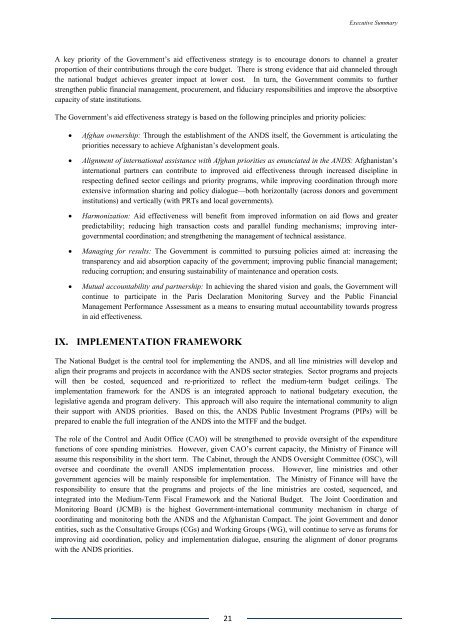Islamic Republic of Afghanistan - Enhanced Integrated Framework ...
Islamic Republic of Afghanistan - Enhanced Integrated Framework ...
Islamic Republic of Afghanistan - Enhanced Integrated Framework ...
You also want an ePaper? Increase the reach of your titles
YUMPU automatically turns print PDFs into web optimized ePapers that Google loves.
Executive SummaryA key priority <strong>of</strong> the Government’s aid effectiveness strategy is to encourage donors to channel a greaterproportion <strong>of</strong> their contributions through the core budget. There is strong evidence that aid channeled throughthe national budget achieves greater impact at lower cost. In turn, the Government commits to furtherstrengthen public financial management, procurement, and fiduciary responsibilities and improve the absorptivecapacity <strong>of</strong> state institutions.The Government’s aid effectiveness strategy is based on the following principles and priority policies:• Afghan ownership: Through the establishment <strong>of</strong> the ANDS itself, the Government is articulating thepriorities necessary to achieve <strong>Afghanistan</strong>’s development goals.• Alignment <strong>of</strong> international assistance with Afghan priorities as enunciated in the ANDS: <strong>Afghanistan</strong>’sinternational partners can contribute to improved aid effectiveness through increased discipline inrespecting defined sector ceilings and priority programs, while improving coordination through moreextensive information sharing and policy dialogue—both horizontally (across donors and governmentinstitutions) and vertically (with PRTs and local governments).• Harmonization: Aid effectiveness will benefit from improved information on aid flows and greaterpredictability; reducing high transaction costs and parallel funding mechanisms; improving intergovernmentalcoordination; and strengthening the management <strong>of</strong> technical assistance.• Managing for results: The Government is committed to pursuing policies aimed at: increasing thetransparency and aid absorption capacity <strong>of</strong> the government; improving public financial management;reducing corruption; and ensuring sustainability <strong>of</strong> maintenance and operation costs.• Mutual accountability and partnership: In achieving the shared vision and goals, the Government willcontinue to participate in the Paris Declaration Monitoring Survey and the Public FinancialManagement Performance Assessment as a means to ensuring mutual accountability towards progressin aid effectiveness.IX. IMPLEMENTATION FRAMEWORKThe National Budget is the central tool for implementing the ANDS, and all line ministries will develop andalign their programs and projects in accordance with the ANDS sector strategies. Sector programs and projectswill then be costed, sequenced and re-prioritized to reflect the medium-term budget ceilings. Theimplementation framework for the ANDS is an integrated approach to national budgetary execution, thelegislative agenda and program delivery. This approach will also require the international community to aligntheir support with ANDS priorities. Based on this, the ANDS Public Investment Programs (PIPs) will beprepared to enable the full integration <strong>of</strong> the ANDS into the MTFF and the budget.The role <strong>of</strong> the Control and Audit Office (CAO) will be strengthened to provide oversight <strong>of</strong> the expenditurefunctions <strong>of</strong> core spending ministries. However, given CAO’s current capacity, the Ministry <strong>of</strong> Finance willassume this responsibility in the short term. The Cabinet, through the ANDS Oversight Committee (OSC), willoversee and coordinate the overall ANDS implementation process. However, line ministries and othergovernment agencies will be mainly responsible for implementation. The Ministry <strong>of</strong> Finance will have theresponsibility to ensure that the programs and projects <strong>of</strong> the line ministries are costed, sequenced, andintegrated into the Medium-Term Fiscal <strong>Framework</strong> and the National Budget. The Joint Coordination andMonitoring Board (JCMB) is the highest Government-international community mechanism in charge <strong>of</strong>coordinating and monitoring both the ANDS and the <strong>Afghanistan</strong> Compact. The joint Government and donorentities, such as the Consultative Groups (CGs) and Working Groups (WG), will continue to serve as forums forimproving aid coordination, policy and implementation dialogue, ensuring the alignment <strong>of</strong> donor programswith the ANDS priorities.21
















